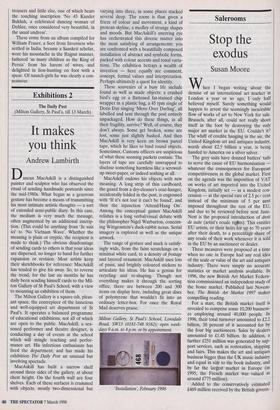Exhibitions 2
The Daily Post (Milton Gallery, St Paul's, till 13 March)
It makes you think
Andrew Lambirth
Duncan MacAskill is a distinguished painter and sculptor who has observed the ritual of sending handmade postcards since the mid-1980s. What began as a generous gesture has become a means of transmitting his most intimate artistic thoughts — a sort of extended semi-public diary. In this case, the medium is very much the message, often augmented by an additional inscrip- tion. (This could be anything from `Je suis ici' to 'No Vietnam Wave'. Whether the meaning is plain or cryptic, the recipient is made to think.) The obvious disadvantage of sending cards to others is that your ideas are dispersed, no longer to hand for further expansion or revision. Most artists keep their sketchbooks for reference: MacAskill has tended to give his away. So, to reverse the trend, for the last six months he has daily been sending himself cards to the Mil- ton Gallery of St Paul's School, with a view to mounting an exhibition of them.
The Milton Gallery is a square-ish, pleas- ant space, the centrepiece of the luxurious and well-equipped art department of St Paul's. It operates a balanced programme of educational exhibitions, not all of which are open to the public. MacAskill, a sea- soned performer and theatre designer, is conducting a day of events at the school which will mingle teaching and perfor- mance art. His infectious enthusiasm has fired the department, and has made his exhibition The Daily Post an unusual but involving spectacle.
MacAskill has built a narrow shelf around three sides of the gallery, at about chest height. On the fourth wall are four shelves. Each of these surfaces is crammed with objects, mostly two-dimensional but varying into three, in some places stacked several deep. The room is thus given a frieze of colour and movement, a kind of protean skyline, a medley of strange shapes and moods. But MacAskill's unerring eye has orchestrated this diverse matter into the most satisfying of arrangements: you are confronted with a beautifully composed installation of abstract and symbolic forms, packed with colour accents and tonal varia- tions. The exhibition betrays a wealth of invention — here equally are comment, concept, formal values and interpretation. Perhaps ultimately a quest for identity.
These souvenirs of a busy life include found as well as made objects: a crushed bird's egg or a flattened fat-stained chip wrapper in a plastic bag, a 45 rpm single of Doris Day singing 'Move Over Darling', all labelled and sent through the post entirely unpackaged. How do these things, in all their fragility, survive? Well, of course, they don't always. Some get broken, some are lost, some just slightly bashed. And then MacAskill is very keen on brown parcel tape, which he likes to bind round objects. Sometimes, Customs officers are suspicious of what these seeming packets contain. The layers of tape are carefully unwrapped to disclose something harmless like a screwed- up sweet-paper, or indeed nothing at all.
MacAskill endows his objects with new meaning. A long strip of thin cardboard, the guard from a dry-cleaner's coat-hanger, accidentally folded in the post, is engrossed with 'If it's not lost it can't be found', and then the injunction 'Attend/Hang On'. Among the conceptual games MacAskill relishes is a long verbal/visual debate with the philosopher Nigel Warburton, concern- ing Wittgenstein's duck-rabbit nexus. Serial imagery is explored as well as the unique artwork.
The range of gesture and mark is satisfy- ingly wide, from the faint scratchings on a minimal white card, to a density of frottage and layered ornament. MacAskill uses lots of paint, and brightly coloured stickers to articulate his ideas. He has a genius for recycling and re-shaping. Though not everything makes it through the sorting office, there are between 200 and 300 items on display here, including great discs of polystyrene that wouldn't fit into an ordinary letter-box. For once the Royal Mail deserves praise.
Milton Gallery, St Paul's School, Lonsdale Road, SW13 (0181-748 9162); open week- days 9 a.m. to 4 p.m. or by appointment.
Installation, February 1998


























































 Previous page
Previous page